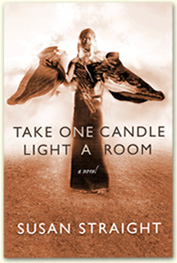
Award-winning novelist Susan Straight will discuss the writing process and her most recent work when she visits California State University, Dominguez Hills as the 2012 Patricia Eliet Memorial Lecture Series guest artist, on Thursday, April 12, at 7 p.m. in the Loker Student Union Ballroom. The event is free and open to the public with a book signing immediately following.
Influenced by authors who used fictional territories in their works, Straight has set nearly all of her stories in Rio Seco, a place which has roots in her hometown of Riverside, but it is really a place located in her imagination.
“I knew even then, at 19, that I didn’t want it to be Riverside, I wanted it to be fictional version of Riverside,” she said, referring to the creation of Rio Seco early in her writing career.
While taking liberties with its geography, she kept real, neighboring areas such as San Bernardino, Pomona, and Los Angeles to take advantage of the region’s diverse features and to provide context.
“If you want to write fiction you don’t have to worry about [whether it’s] really going to be on this street or that. If you’re able to play with the geography and the land… it’s truly fiction,” Straight said.
And much like her setting, the inspiration for characters in Straight’s novels also come from everyday situations, infused with her own imagination. A 7-year-old boy in her neighborhood who showed signs he had been abused was the impetus for Victor, the character in her latest book “Take a Candle Light a Room,” she said. While the character for Victor’s mother was inspired by a murdered 17-year-old woman whose body was left in a shopping cart in Straight’s neighborhood more than 15 years ago. Straight said she wanted to know who these people could be, what their story could be. Without the facts, she created a fictional place and weaved their lives together.
 “Victor is 20 years old, has dreadlocks and is really, really smart. He could be anything he wants to be. He wants to go to college, but he’s got this beautiful mother who’s addicted to drugs because she was abandoned by Victor’s father. It’s sort of a story of what is a good mother and what does it mean to be the son who’s really smart, of someone who lives in another world?” said Straight, adding that while the story was born out of an intriguing situation, the characters ultimately have nothing to do with anyone who is real.
“Victor is 20 years old, has dreadlocks and is really, really smart. He could be anything he wants to be. He wants to go to college, but he’s got this beautiful mother who’s addicted to drugs because she was abandoned by Victor’s father. It’s sort of a story of what is a good mother and what does it mean to be the son who’s really smart, of someone who lives in another world?” said Straight, adding that while the story was born out of an intriguing situation, the characters ultimately have nothing to do with anyone who is real.
So, how does a writer decide whether to write fiction or non-fiction? That is one of the topics Straight said she commonly discusses with students at the campuses she visits and at University of California Riverside, where she currently teaches creative writing. She helps novice writers with their decision by telling them that fiction allows more freedom to tell a story.
She suggests fiction writers use their imagination and focus on descriptive details to make a reader really feel like they are in the story with the characters, and she urges writers of any genre to be good listeners.
“It’s not about you, it’s about the story,” Straight said. “Put in what is important to the story and the reader, not you.”
Straight has been called the Meryl Streep of novelists by book reviewer and author Ayelet Waldman, because she has the “uncanny ability to disappear into her characters, to immerse herself so completely and convincingly that you believe wholeheartedly that she is the people about whom she writes.”
Straight, who began writing as a teenager, is the author of seven novels, and numerous short stories, essays and articles, which have been published in magazines and journals such as The New York Times Magazine, the Los Angeles Times Magazine, Harpers, Reader’s Digest, Salon, Zoetrope, McSweeneys, The Believer, and Black Clock. Her latest novel, “Take One Candle Light a Room,” was named one of the best novels of 2010 by The Washington Post, the Los Angeles Times and Kirkus. She won the Gina Berriault Award for Fiction in 2011. “Highwire Moon” was a finalist for the 2001 National Book Award, and “A Million Nightingales” was a 2006 finalist for the Los Angeles Times Book Prize. Her short story “The Golden Gopher” won the 2008 Edgar Award for Best Mystery Story. Straight currently is distinguished professor of creative writing at University California Riverside.
The lecture series honors former CSU Dominguez Hills professor of English Patricia Eliet, who taught at the university from 1969 to 1990. This year’s event is sponsored by the College of Arts and Humanities, the Department of English, and Associated Students Incorporated.
RSVP is suggested, as this is usually a standing-room-only event.
For more information about the lecture, email rhernandez@csudh.edu or call (310) 243-3322.